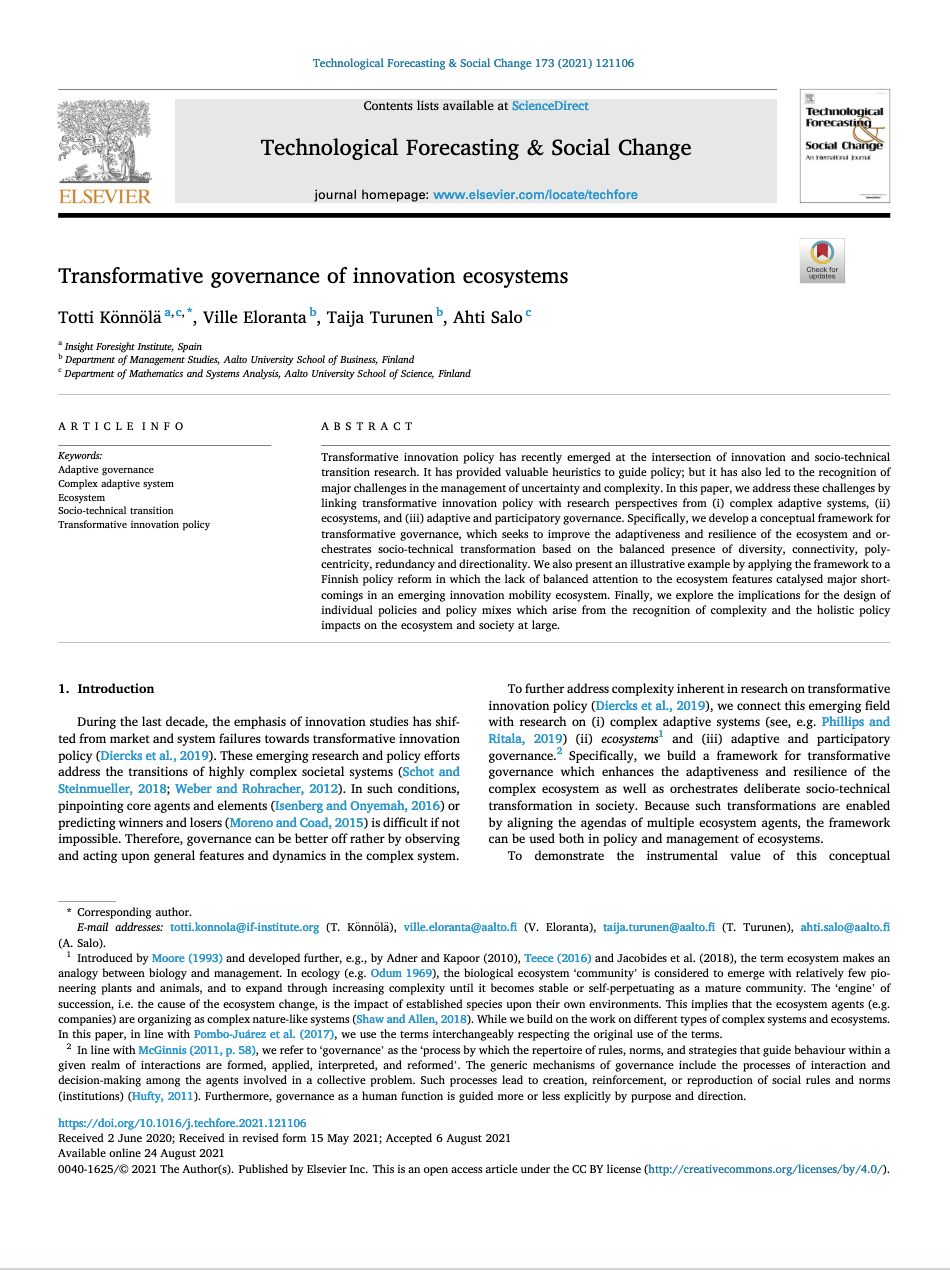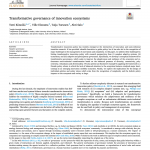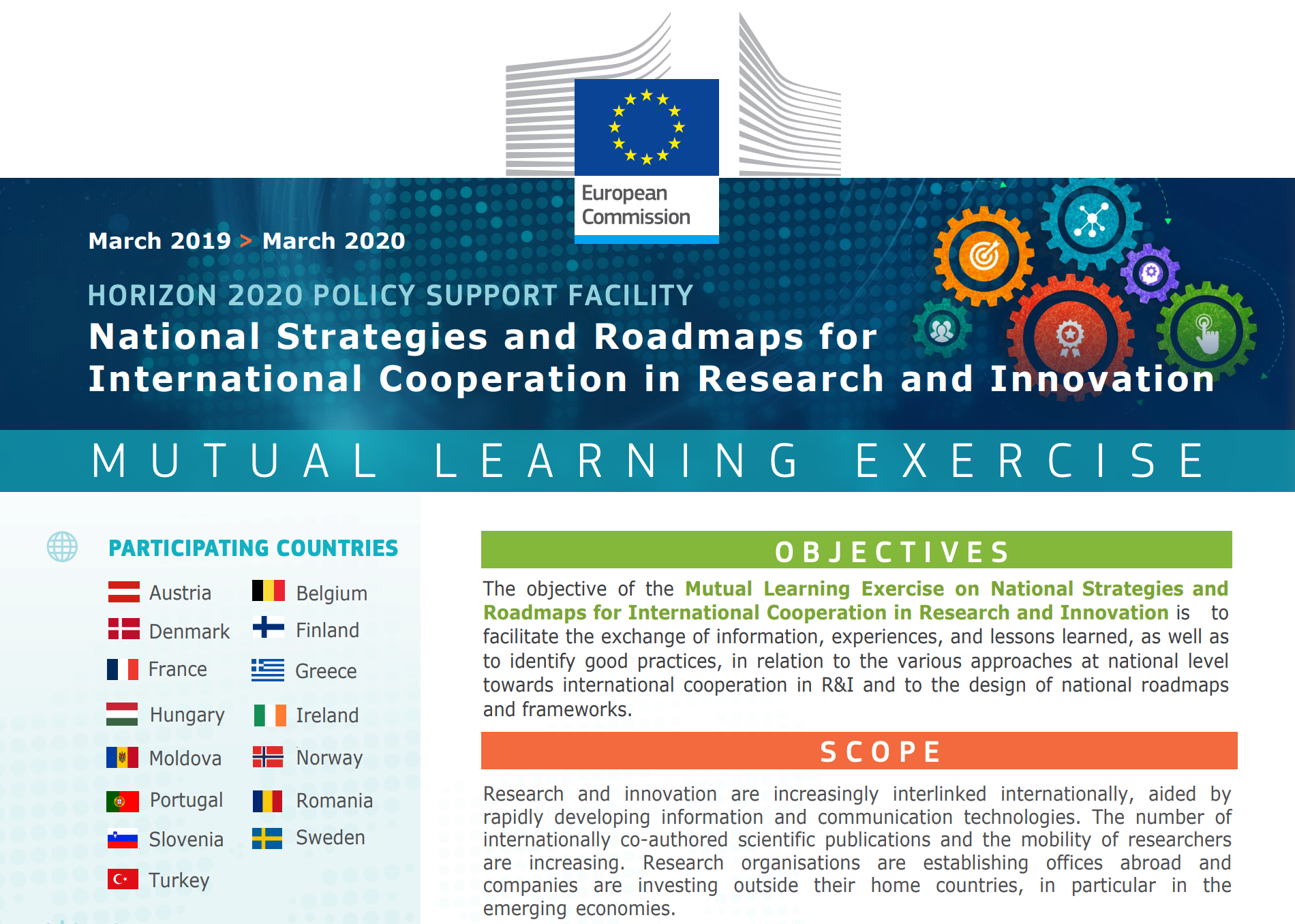At the Insight Foresight Institute, we have recently conducted a study for ENISA – Empresa Nacional de Innovacion, S.A. on this subject focusing on initiatives launched by public sector entities. Our mapping points to initiatives that explicitly address mission orientation and ecosystem-based approaches to a greater or lesser extent. Our work helps to understand how mission-oriented innovation initiatives operate and everything that actually happens, from the pre-planning stages to the moment they are launched, and we start to see short- and long-term results, going through all the necessary economic, political and social organization and management to make each initiative happen.

Today there is a growing global concern about economic, social and environmental issues, and therefore, different countries are trying to be actors of change and close the gap between just creating knowledge and actually taking action. Indeed, a series of decisive policy measures and efforts are needed to ensure that the innovation policies of the next generations are up to the challenges we are facing today. Focusing on mission orientation is a new challenge, but it is also a great opportunity. An opportunity motivated by the ambition to explore the ecosystem’s tools more broadly by leveraging the relationship with entrepreneurs and the notion of mission to move towards an optimal social position.
Beyond generating economic growth, entrepreneurial ecosystems and innovation policies are increasingly expected to contribute to solving social challenges and that is why many of the mission-oriented innovation initiatives have as one of their key objectives to foster the implementation of the SDGs.
Innovation policies, therefore, seek to generate transformational change in society. However, attention must be paid to the possible areas of failure that arise when implementing these policies for change, which are directionality, policy coordination, demand-articulation and reflexivity. To achieve the objective of these policies, it is necessary to implement measures that ensure coordination between these policies and the different sectors of society to stimulate new development paths and increase solutions that better respond to challenges at a local, national, European and global level.
Missions have a great power of change that can also contribute to the development of ecosystems. It is essential to support entrepreneurship and understand the complexity of its operating environment to be able to offer help and resources efficiently. In this sense, the concept of ecosystem has great value in the entrepreneurship environment and refers to the above. It can be said that ecosystems involve an interrelationship between companies and their social, political, academic and economic environment, and depending on the environment this relationship will be more or less fluid. It is very difficult to determine these relationships independently, so it is more appropriate to address them all together. All these factors are considered and put in value when proposing mission-oriented innovation initiatives, since they are initiatives with enormous transforming power and before launching a project of this size it is necessary to be very conscious of all that it implies and all the elements that compose it in order to achieve the objectives set in an effective way.
The rationale elaborated above directs our mapping towards initiatives that explicitly address mission orientation and ecosystem-based approaches to a greater or lesser extent. Therefore, in this study, we have chosen to analyze different mission-oriented innovation initiatives from three different approaches that in practice often overlap.
- On the one hand, we have research-driven, mission-oriented innovation initiatives with an emphasis on knowledge creation. These initiatives are mainly led by research organizations that address specific challenges with clear objectives, concrete deadlines and give enormous importance to the development of technology, as it produces a great social impact. In this section, we have included three initiatives that we have found very interesting, such as the Horizon Europe missions, the SFI challenges and the Vinnova challenge-driven innovation program.
- On the other hand, we have industry-driven innovation ecosystem initiatives with an emphasis on knowledge application. These initiatives are led by large corporations involving diverse stakeholders to jointly address innovation and market creation, often in relation to poorly defined challenges. What differentiates this category from the other two is the existence of a mature business model and an effective industry structure at the international level. In this section, the initiatives chosen were the knowledge communities of the Institute of Innovation and Technology (EIT), the UK Catapult centres and the Canadian Superclusters.
- Finally, we analyzed entrepreneurs-driven entrepreneurship ecosystem initiatives with an emphasis on market access and scaling up. These initiatives are driven by intermediary agents that improve the capabilities and general conditions for entrepreneurship. Likewise, other factors such as business creation and development support measures also seek to provide useful solutions to current social challenges. In this last section we have analyzed three other initiatives from three different areas of the world: Business Finland’s Growth Engines, Manizales-Mas in Colombia and Turkey’s SDG Impact Accelerator.
Therefore, in this study, nine public initiatives are analyzed in depth by adopting a longitudinal approach in terms of missions and based on six areas of analysis, namely the introduction and background of the initiative, its objectives and goals, the actors involved, the type of governance, the support mechanisms and the programming.
Each of the initiatives is unique in itself and presents characteristics that are very different from the rest, which are worth analyzing in detail and emphasizing as we do in the report. However, they also share some common features.
In some cases, the initiatives outsource the programming of the instruments used in the process. This can be cumbersome but is interesting to consider as it eases the administrative burden and incentivizes ecosystem coordination. Regardless of the emphasis on in-house or outsourced management practices, programming can benefit from incorporating several stages that allow for flexible reallocation of resources based on monitored performance. In line with the international trend, it would also be interesting to consider the possibility of establishing incentives and requirements for beneficiaries in other contexts within ecosystems.
Likewise, mission development is a complex process that requires the joint collaboration of various parties to achieve the desired outcome. In designing the procedures of an agency seeking to obtain and use intelligence in this process, it is very important to implement more directional, mission-oriented approaches. The reasons for selecting and prioritizing mission domains should be controlled through transparent communication among ecosystem actors. Ideally, these processes engage stakeholders in activities in which they participate jointly, but in which they not only create joint visions but also develop collaborative relationships to better address the joint challenges that arise.
It is therefore worth asking whether these innovation initiatives are an efficient and effective tool for change to address the economic, political, and social problems that arise daily in our society. Each one of them presents clear and defined goals that are already being carried out to a greater or lesser extent, thus meeting the challenges we face as a society. Every day there is more and more interest and concern worldwide to propose and carry out innovation policies that really lead us towards more inclusive and sustainable business and growth models. However, we need to invest even more in R&I and bet on mission-oriented instruments and initiatives aimed at creating systemic change in society.
You can download the full report free of charge below. For more information, please contact: info@if-institute.org.
1/2021 IFI Report - Mission-oriented Instruments
Send download link to:




